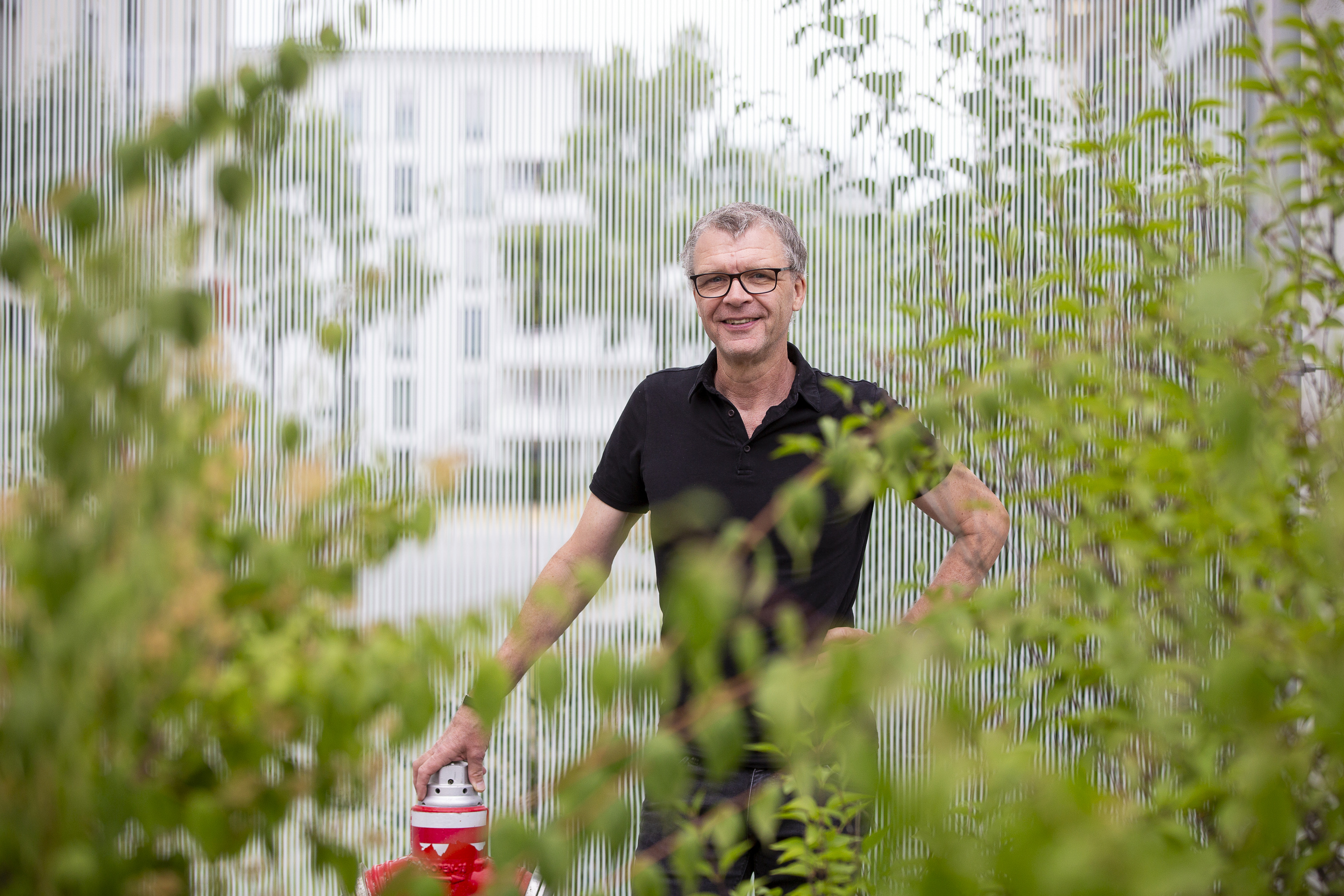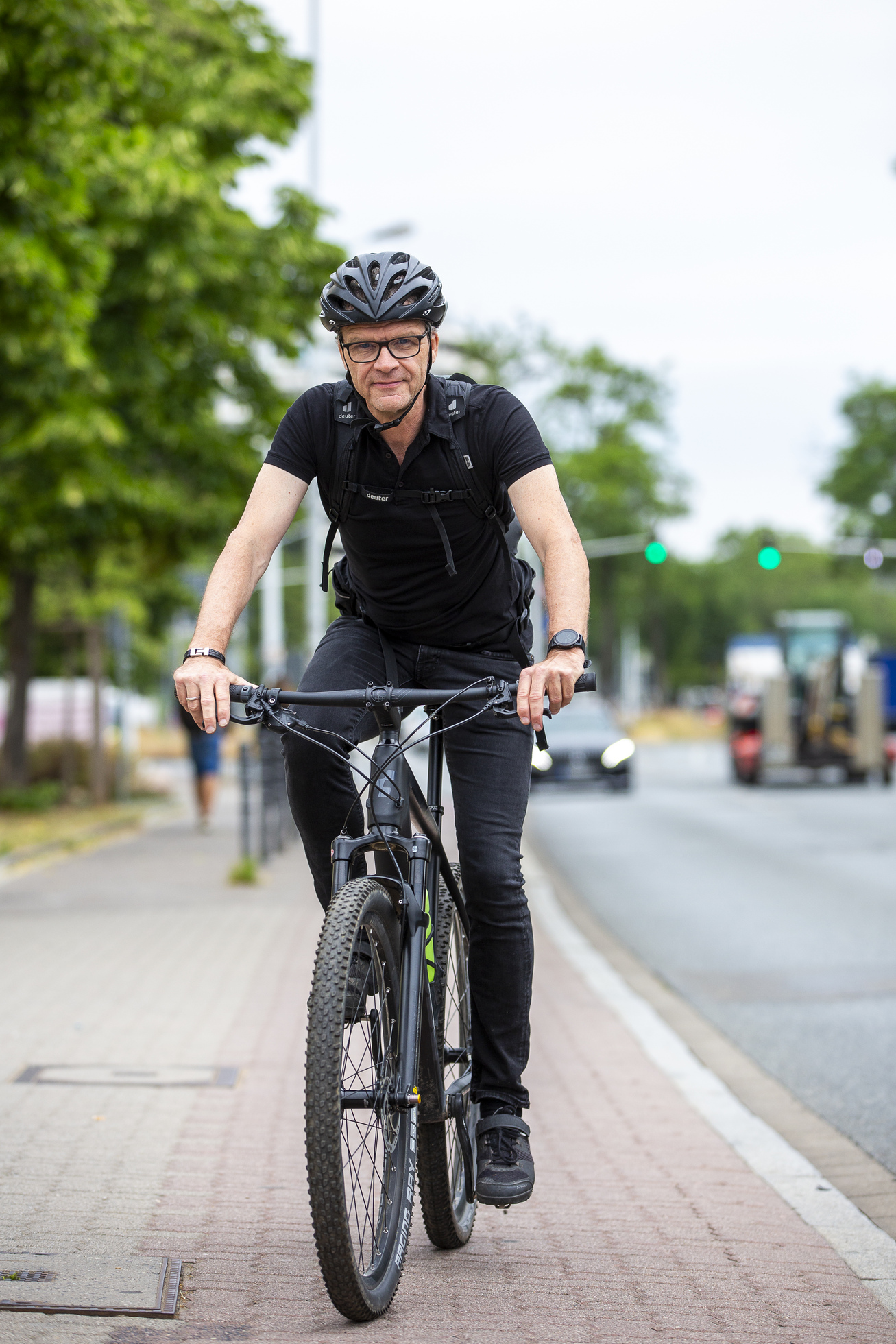“The effort for consumers must be minimal”

The young generation is being socialised into a society that is diametrically opposed to the idea of “consuming less, consuming wisely, consuming sustainably,” says Andreas Homburg, Professor of Environmental Psychology and Sustainability. In his view, it is “morally unjustifiable” to expect young people to act in an environmentally conscious way just because older people have “bungled” climate change. It makes more sense, he says, to encourage such action across the generations. Homburg, a scientist at the Faculty of Social Sciences of Darmstadt University of Applied Sciences, is studying the conditions that facilitate behavioural changes.
Interview: Canan Topçu, 14.6.2023
impact: What are your teaching and research topics?
Professor Andreas Homburg: One of them is human behaviour vis-à-vis the environment: how can we explain it, how can we change it and how should campaigns be designed. We explore these questions together with our students. What concerns us is how we can manage to bring about a transformation, that is, also a systemic change, because just separating our waste is not enough, much more needs to happen. We need to revisit infrastructures and create new mobility options... even so far as a shift in society’s values. Within our MSc in Business Psychology, we also explicitly devote ourselves to topics such as social change. The programme is structured in such a way that students first learn the fundamentals, then design campaigns and develop change processes themselves. Once they have graduated, they are capable of even more than some lecturers. They are at the leading edge of this development, they work on change concepts and assimilate not only the traditional knowledge found in textbooks because what we are working on at the university has not yet precipitated into textbook knowledge.
impact: Why not?
Homburg: Five or six years ago, the climate was not yet a topic at the forefront of people’s consciousness or on the political agenda, but that has changed radically. We can no longer ignore climate change, and as a result there are also changing imperatives, meaning that I really do have to rework my lectures every year in order to keep pace.
impact: How sensitive are students towards environmental issues?
Homburg: I cannot generalise. I only get to see some of them because I teach environmental psychology. The students come to my seminars because they are interested in these topics. And I can see that the level of interest among these students is very high. They are very enthusiastic, but not in the sense of collective action, as we call it, that is, collective and organised political action. They are not activists, most of them think in terms of the system, and in the first instance they want to include these topics in their own professional development. Their preferences in their professional and personal lives sometimes differ. Some of them are perhaps truly environmentally conscious, others like to travel. But, of course, they won’t broadcast that in class because it’s not eco-friendly, is it? My impression is that the students are looking for ways to combine classic psychology topics with environmental issues.
impact: Concerning environmentally conscious action: I’ve heard that you have summarised studies on this subject in a review paper?
Homburg: There is a willingness to act in an environmentally conscious way. But if the effort is too great, hardly anyone does it in practice. Effort means, for example, going to the supermarket with three reusable containers. Only very motivated people make this effort. Concepts for implementing this in practice need to be well thought through. Let me illustrate this with an example: there is a lot of experimenting going on with reusable packaging, such as to-go coffee cups. Re-cups. To prevent the constant wastage of plastic cups, reusable cups are a good approach. But I don’t believe that they will really catch on.

impact: Where do the problems lie?
Homburg: For this to succeed, the effort for consumers must be minimal. To do this, we first have to look at what barriers there are and where the advantages lie. We dealt with this in the seminar. Barriers are, for example, the fact that you have to wash the reusable cup, remember to take it with you and it takes up additional space. The advantage is that it saves money, protects the environment and is more stable. We need to highlight the advantages and for this we need marketing campaigns – and specifically “community-based social marketing”. Among the things that are important for small change processes is that a minority which talks about its behaviour can make an impact. Talking quite naturally about your own conscious actions can motivate others. This works best when these role models are people you respect or who are like you and who you think are credible. We humans are by all means willing to change things – in the long term as well. But we know that people who don’t think about their range of possibilities in the first place or take on too much fail because they try to do things that are too complicated. In addition, most of them start doing something spontaneously which, however, does not benefit the environment much at all. We should pay attention to efficiency. Installing LED lamps, being good and turning off the lights, that’s great. But it would be more important to look at where the electricity comes from in the first place.
impact: But what was regarded as environmentally friendly yesterday might no longer be so today – take pellet heating systems, for example. According to environmental protection organisations, this fuel is not as climate-neutral as was claimed a few years ago...
Homburg: It’s not always the case that something later turns out to be not so good after all. But what we have learnt is that if politics regulate or change something, for example promoting pellets, then you must look at the whole supply chain. Another example: if you introduce an animal welfare seal, then the overall framework must also be properly thought through so that meat from livestock bred under poor conditions in other countries does not come onto the market nonetheless. Another example: e-scooters, which have not led to people using their cars less. They are a fun type of mobility – with negative health effects: instead of walking or cycling, people go by scooter.
impact: Can environmental awareness and the necessary changes be enforced through collective action?
Homburg: Activism becomes necessary when you are not heard via the usual channels. People who campaigned for women’s equality, for example, did not become activists because women were present everywhere, but because they were underrepresented. They had to interfere in a provocative way, which some found irritating. That is what environmental activists are endeavouring to do as well. What’s exciting is the question of the conditions under which this is happening. I think the environmental movement – like all other social movements ؘ– would have an equally good chance of becoming mainstream if it were not under so much time pressure. A woman at the beginning of the last century would presumably have been just as cross if someone had told her: “Believe me, it’ll be another 100 years before you women are allowed to vote.” The climate activists’ argument is understandable: in Germany, we’re seeing a temperature increase of around 1.6 °C. We simply cannot wait 100 years until measures are taken. As a psychologist, I ask myself how activists could and ought to articulate their protest in such a way that it is not divided into good and evil, since this would give them a good chance of being heard by the mainstream.
impact: What is your answer?
Homburg: They must be credible and consistent, that is, not act one way today and completely differently tomorrow. Otherwise, the majority will say: “They’re nuts!” The majority tries to pigeonhole the minority. That was also the case with the women’s movement, for example. You should try to reach people again and again, not use force to implement your actions and not simply point a finger at the guilty, but instead offer solutions.
Contact
Christina Janssen
Science Editor
University Communication
Tel.: +49.6151.533-60112
Email: christina.janssen@h-da.da
Translation: Sharon Oranski